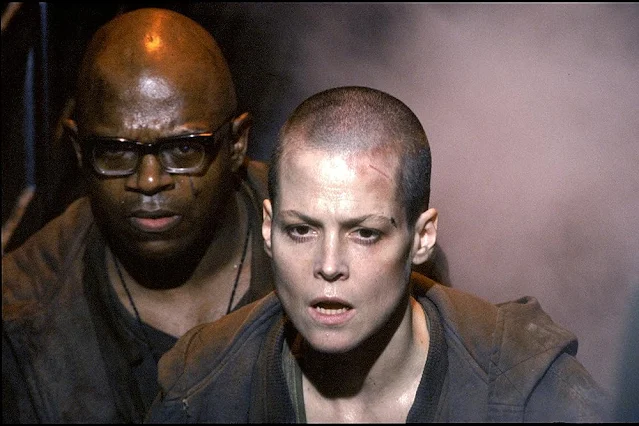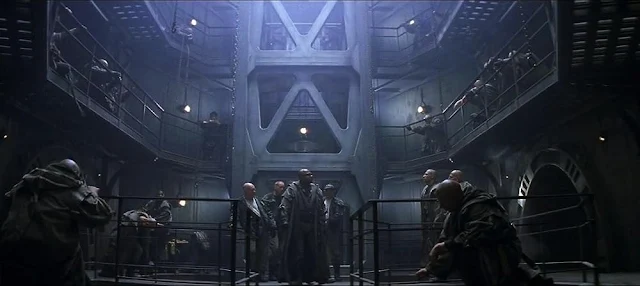While the original script by Vincent Ward had even more overt religious symbolism, Fincher's final product still retains a strong focus on religious undertones, particularly through the inmates' religious beliefs and their interpretation of the Xenomorph.
This discussion aims to provide an in-depth analysis of these religious elements, especially focusing on how the inmates, under the spiritual guidance of Dillon (Charles S Dutton), perceive the Xenomorph as a manifestation of evil, akin to the biblical "Dragon."
The Inmates' Religious Beliefs
The prison colony in "Alien 3" is a grim place, populated by inmates who have committed crimes so severe that they've been exiled to the far reaches of space. These are men who have found a form of redemption and purpose through a unique, apocalyptic form of millenarianism. Dillon, the spiritual leader, serves as the moral compass for these lost souls.He often leads the inmates in prayer and sermons, emphasizing themes of repentance, redemption, and the end times. The scriptwriters, including David Giler and Walter Hill, seem to have intentionally created a microcosm of society where faith serves as the last refuge for men who have nothing left to lose. This setting serves as fertile ground for exploring how faith can be both a source of strength and a lens through which terror is interpreted.
The Xenomorph as the "Dragon"
When the Xenomorph makes its appearance in the colony, Dillon doesn't hesitate to label it as the "Dragon," drawing a direct parallel to the biblical symbol of evil. In the Bible, particularly in the Book of Revelation, the Dragon is often interpreted as a representation of Satan or the Antichrist.Dillon's interpretation is not a mere naming convention; it's a deeply rooted belief that the creature is a test of their collective faith, a demonic entity that they must combat to prove their worthiness in the eyes of God.
The scriptwriters seem to be exploring the idea that in times of extreme crisis, religious symbolism can offer a framework for understanding and combating evil, even if that evil comes in the form of an extraterrestrial life form.
Dillon's Sermon
In a pivotal scene that serves as a turning point for the inmates, Dillon delivers a sermon-like speech to galvanize the men into action. He says,You're all gonna die. The only question is how you check out. Do you want it on your feet? Or on your knees... begging? I ain't much for begging! Nobody ever gave me nothing! So I say fuck that thing! Let's fight it!
This speech is not just motivational; it frames their upcoming battle with the Xenomorph as a holy war, a fight against the ultimate manifestation of evil. The scriptwriters, through Dillon's character, seem to be commenting on the human need for purpose, especially when facing insurmountable odds. In this case, the purpose is divinely ordained, elevating their struggle to a cosmic scale.
Theological Interpretations -
Take this with a grain of salt but here we go, dear reader... these are wild but if you squint your eyes just right you can see the interplay.The theological underpinnings of "Alien 3" reach their zenith in the inmates' perception of the Xenomorph, which serves as a complex reflection of their own self-view as sinners in need of redemption.
These are men who have been cast away from society, not just for their crimes but also, in their view, from the grace of God. They see themselves as flawed, broken individuals who are deserving of divine punishment. In this context, the arrival of the Xenomorph isn't just a threat to their physical well-being; it's a spiritual challenge, a test of their faith, and perhaps a form of divine retribution for their past sins.
The screenwriters, David Giler, Walter Hill, and Larry Ferguson, along with director David Fincher, seem to be delving into the concept of theodicy, which explores the problem of evil in a world supposedly governed by a benevolent God. The inmates' interpretation of the Xenomorph's arrival as a form of divine retribution aligns with the idea that suffering and evil can serve as tests of faith. In this view, the Xenomorph becomes a divine instrument, a way for these men to prove their worthiness or accept their damnation.
This theological interpretation is most evident when the inmates, led by Dillon, opt for a plan to trap the Xenomorph in the lead works—a hellish environment filled with molten metal, fire, and unbearable heat. The choice of the lead works as the battleground is highly symbolic. In religious literature, Hell is often described as a place of eternal fire, and by choosing to confront the Xenomorph here, the inmates are essentially walking into Hell to face what they perceive as the Devil incarnate.
Moreover, the act of trapping the Xenomorph in the lead works can be seen as a form of exorcism, a ritualistic attempt to contain and eliminate evil. The screenwriters seem to be drawing parallels between the inmates' actions and the biblical stories where figures like Moses and Elijah confront evil in its own domain. Just as Moses descended into Pharaoh's court to liberate the Israelites, the inmates descend into the lead works to confront and hopefully vanquish the Xenomorph.
This adds a layer of theological gravitas to their actions, elevating their struggle from a mere physical battle for survival to a spiritual war for the salvation of their souls. The screenwriters and Fincher are not just telling a horror story; they are engaging the audience in a theological discourse that explores the complexities of faith, the nature of evil, and the eternal quest for redemption.
The screenwriters, David Giler, Walter Hill, and Larry Ferguson, along with director David Fincher, seem to be delving into the concept of theodicy, which explores the problem of evil in a world supposedly governed by a benevolent God. The inmates' interpretation of the Xenomorph's arrival as a form of divine retribution aligns with the idea that suffering and evil can serve as tests of faith. In this view, the Xenomorph becomes a divine instrument, a way for these men to prove their worthiness or accept their damnation.
This theological interpretation is most evident when the inmates, led by Dillon, opt for a plan to trap the Xenomorph in the lead works—a hellish environment filled with molten metal, fire, and unbearable heat. The choice of the lead works as the battleground is highly symbolic. In religious literature, Hell is often described as a place of eternal fire, and by choosing to confront the Xenomorph here, the inmates are essentially walking into Hell to face what they perceive as the Devil incarnate.
Moreover, the act of trapping the Xenomorph in the lead works can be seen as a form of exorcism, a ritualistic attempt to contain and eliminate evil. The screenwriters seem to be drawing parallels between the inmates' actions and the biblical stories where figures like Moses and Elijah confront evil in its own domain. Just as Moses descended into Pharaoh's court to liberate the Israelites, the inmates descend into the lead works to confront and hopefully vanquish the Xenomorph.
This adds a layer of theological gravitas to their actions, elevating their struggle from a mere physical battle for survival to a spiritual war for the salvation of their souls. The screenwriters and Fincher are not just telling a horror story; they are engaging the audience in a theological discourse that explores the complexities of faith, the nature of evil, and the eternal quest for redemption.
Sacrifice and Redemption
One of the recurring themes in "Alien 3" is the idea of sacrifice for the greater good, which has strong religious connotations. Dillon's ultimate sacrifice towards the end of the film, where he chooses to stay behind to ensure the Xenomorph is killed, echoes the concept of martyrdom found in many religious traditions. His act serves as a form of redemption, not just for himself but for the community he led.This mirrors the Christian concept of Christ's sacrifice, where one man's suffering leads to the salvation of many.
 |
| Ripley and Dillion |















